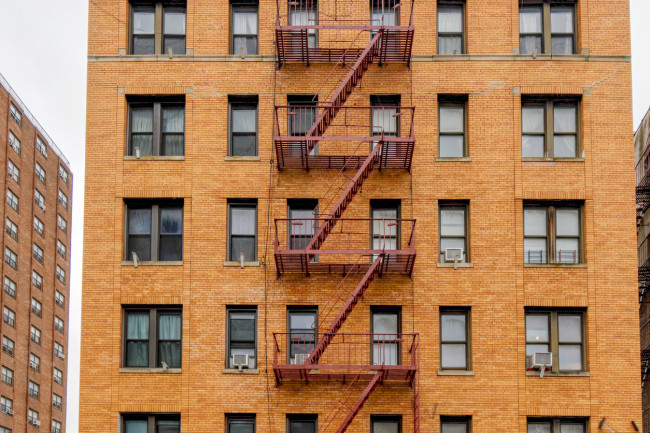NYC renters have filed hundreds of FARE Act complaints. Here’s what happens next
- The Department of Consumer and Worker Protection investigates FARE Act violations and has won three cases
- DCWP found a pattern of agents pressuring renters to hire them or asking outright for renters to pay their fee
- Some renters told Brick Underground they lacked the time to report brokers during a hectic apartment search

Under the FARE Act, a renter can complain to DCWP if they’re being pressured to pay a landlord broker’s fee.
iStock
This summer, New York City renters filed hundreds of reports against agents and landlords for violating a new law that requires landlords to pay commissions for the brokers they hire. But what happened after the city collected those complaints? The answer is not much—yet.
Since June 11th, the Department of Consumer and Worker Protection (DCWP) has received 1,125 complaints and questions about the Fairness in Apartment Rental Expenses (FARE) Act, DCWP spokesperson Stephany Vasquez Sanchez told Brick Underground. The FARE Act mandates landlords to pay their own brokers, rather than asking renters to cough up their fees.
Of those complaints, the department has settled three disputes and won another three at a city court, Vasquez Sanchez told Brick.
Those numbers represent the start of DCWP’s enforcement of the new law, which went into effect in June despite massive opposition from brokers (and a still-ongoing lawsuit). Under the FARE Act, a renter can complain to DCWP if they’re being pressured to pay a landlord broker’s fee, often up to 15 percent of a year’s rent.
The DCWP’s special broker fee team investigates agents and landlords and issue fines up to $2,000 under the new law.
“We have a dedicated team who are actively investigating these complaints and also assessing which are actionable to bring administrative charges,” Vasquez Sanchez said. “We urge any New Yorker who believes they’ve encountered a violation of this law to reach out to us as soon as possible by calling 311 or visiting nyc.gov/consumers."
But proving a FARE Act violation requires a lot of details that renters often leave out, Vasquez Sanchez said. (And some renters Brick Underground spoke with were hesitant to make a complaint in the first place.)
“Many of the complaints we have received so far have not included the actionable evidence we need to issue a summons,” Vasquez Sanchez said. “Many of the consumers we have reached out to have also so far not responded to our requests for additional information.”
Read on for everything you need to know before you make a FARE Act complaint, and what to expect after.
What to include in a FARE Act report
The rental market moves fast. Listings can appear and disappear in a matter of days, along with the evidence of a possible FARE Act violation. That’s why it’s crucial to collect as much information as possible when you make a report.
You can report brokers or landlords for demanding that you cover the fee of an agent you didn’t hire, or if a broker requires you to pay their fee to rent an apartment by calling 311 or filling out DCWP’s online form.
Make sure to include screenshots or photos of the listing in question—including the date the photo was taken and the full URL of the listing—the name of any websites where the apartment was listed, records of any conversations with an agent such as texts or emails, and your and the agent’s contact information, if you have it.
All of that information helps DCWP build the strongest case they can against an agent or landlord, and complaining also means the city can recognize patterns among those who break the law, and how they do it.
Scams to watch out for
According to DCWP, renters are complaining about two things: agents illegally charging a broker fee, or bait-and-switch schemes involving a broker who won’t show an apartment to a would-be-renter unless that renter agrees to pay their fee. (And most of those complaints are for Brooklyn apartments, according to DCWP complaint data from June 11th through Oct. 1st.)
Both of those scams happened to James, a renter raised in Borough Park who was looking for an apartment in Brooklyn for his parents who have a modest budget of up to $2,500 a month. (James asked to use a pseudonym to speak candidly about his experience.)
James said that one listing agent told him that he would have to hire the agent before being shown any apartments. But more commonly, James said he’d inquire about an apartment on StreetEasy, only to have a broker claim that it was no longer available—sometimes just hours after it was put up online—and then offer “off-market listings” James could only access if he agreed to pay for that broker’s services. (The FARE Act allows agents to ask renters to pay a commission if the renter hires the agent.)
James shared screenshots of emails from a brokerage that made the FARE Act part of their sales pitch, arguing that “more and more renters” are hiring agents because “many listings have been pulled” off listing platforms since the FARE Act went into effect. (A Real Estate Board of New York spokesperson told Brick Underground that it is not illegal for an agent to promote other listings to a renter who inquired about an apartment that is unavailable.)
Luckily, James’s parents were able to negotiate with a landlord to keep their current place. And James did report at least one suspicious listing to StreetEasy, but said he didn’t make a report to the city because he said he didn’t have the time.
Another renter, Adrianna, also experienced what she called a bait-and-switch, but said she too lacked the time to make a formal report to DCWP. Adrianna, who asked to use a pseudonym because she still hasn’t found a new apartment, wants to move back to NYC from Virginia, where she moved in 2024 when the Bushwick apartment she had rented for more than a decade became unaffordable.
When Adrianna inquired about a one bedroom in Flatbush she found on StreetEasy, she said she got a call a few days later from a woman from the “real estate office” who said the unit was no longer available, but offered a nearby apartment for a similar price. The woman asked Adrianna if she was willing to pay a broker fee, and abruptly hung up after Adrianna said she wasn’t interested in paying any fees, Adrianna said.
Why (and where) you should report
Both Adrianna and James pointed out one major obstacle to reporting bad brokers: a lack of time. Because apartment hunting is so time consuming (and stressful), both said they couldn’t make a report to the city and that it was easier to flag listings on StreetEasy.
But renters should always report potential violations of the FARE Act to DCWP first, said Amanda Shur, a spokesperson for StreetEasy. Shur encouraged renters to report listings on the platform as well, but noted that DCWP is the agency with the power to enforce the law.
“We always recommend that renters report violations to DCWP because they are the enforcing agency of the FARE Act.” Shur said. “They're the ones that are responsible for issuing those violations and fines. So it's really important that renters report there first.”
StreetEasy also launched a new tab on its website that breaks down the costs and fees associated with an apartment. (FYI: Under the FARE Act, a brokerage that publishes a listing is presumed to be working for the landlord, and cannot collect their fee from the renter.)
What happens after you report: Investigation and enforcement
After a renter complains, a DCWP attorney reviews their case, collects more evidence, and determines whether DCWP should summon a landlord or broker to the Office of Administrative Trials and Hearings (OATH), a court that holds hearings for city agencies, to explain themselves.
DCWP has issued “about 25” summonses to brokers, landlords, or property managers for FARE Act violations, Vasquez Sanchez said. Once at OATH, DCWP can issue fines and seek restitution—such as a refunded broker fee.
But don’t expect your money back quickly, if at all. If you’re willing to pay a broker a fee that they’re illegally demanding to secure an apartment, and plan to get it back after making a complaint, know that DCWP’s investigation will take time. And there’s a chance you won’t get that money back at all if they’re unable to prove your claims.
“You really have to assess whether you’re OK eating that broker fee for a long period of time, and are you comfortable with potentially never getting it back?” said Allia Mohamed, CEO and co-founder of openigloo, an apartment listing and review website.
But, she warned, “if your first interaction with a building is the agent breaking the law, that is an extremely bad indication of what your space is going to be like in that building.”
[Editor’s note: This story was updated on Oct. 31st to include information from the Real Estate Board of New York that agents can promote their services to renters when renters reach out.]




























